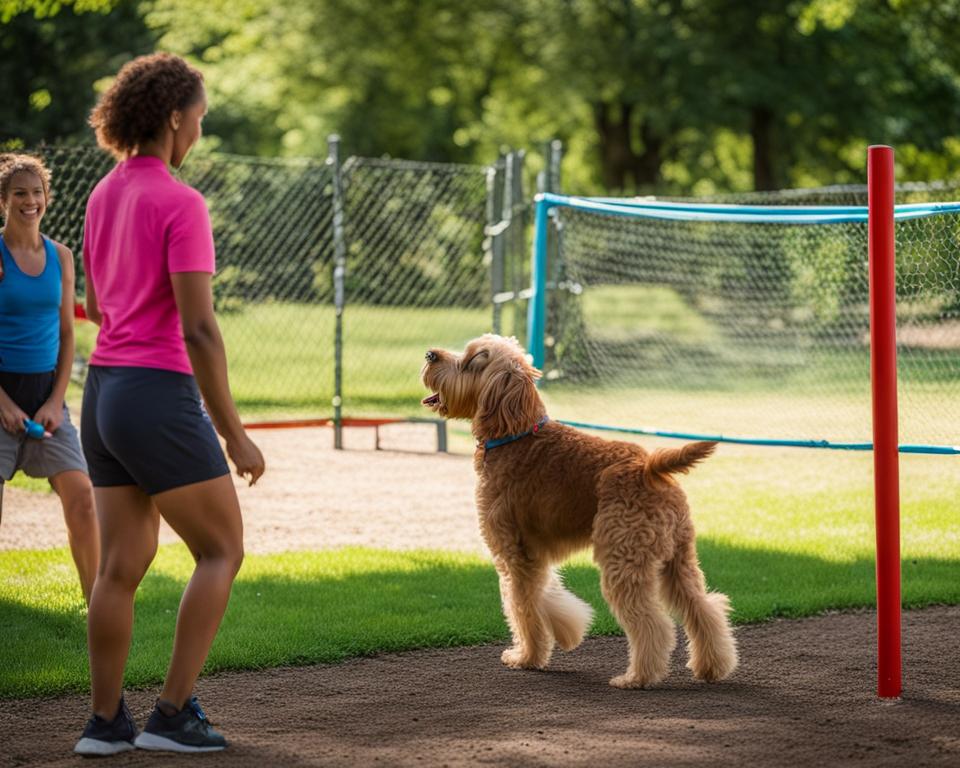Labradoodles are popular breeds of dogs known for their unique combination of personality traits. They have captured the hearts of many dog lovers around the world because of their friendly, intelligent, and social nature. Labradoodles are quick learners and have an affable temperament, making them excellent therapy and assistance dogs.
One of the notable characteristics of Labradoodles is their loving and playful nature. They are naturally affectionate and enjoy spending time with their families. Their intelligence and eagerness to please make them highly trainable, excelling in obedience training.
Labradoodles have a moderate to high exercise need, requiring regular physical activity to keep them happy and healthy. They enjoy activities such as fetch, agility, and swimming. Additionally, they require regular grooming to prevent matting and maintain their coat’s health and appearance.
Whether it’s their friendly personality, intelligence, or exercise needs, Labradoodles possess a unique set of traits that make them a wonderful addition to any family.
Key Takeaways:
- Labradoodles have a friendly, intelligent, and social personality.
- They are quick learners and excel in obedience training.
- Labradoodles have a moderate to high exercise need and enjoy activities such as fetch, agility, and swimming.
- Regular grooming is necessary to prevent matting in their coat.
- Labradoodles make great therapy and assistance dogs.
Labradoodle Breed History & Background
The Labradoodle breed has a fascinating history and background that traces back to Australia in the 1980s. The development of Labradoodles was driven by the desire to create a guide dog that would be hypoallergenic, making them suitable for individuals with allergies. To achieve this, Labrador Retrievers and Poodles were crossbred, combining the intelligence and trainability of the Poodle with the friendly and affectionate nature of the Labrador Retriever.
These initial crosses were made possible through the efforts of the Royal Guide Dogs Association of Australia. The breeders aimed to create a dog that not only possessed hypoallergenic traits but also exhibited the intelligence and temperament required for guide dog work. The Labradoodle’s success in these areas led to increased interest and the desire for further breeding to refine the breed.
One key aspect to note is the ongoing standardization process of the Labradoodle breed. Due to the variation in coat type and temperament resulting from crossbreeding, the breed is not yet officially recognized by the American Kennel Club (AKC). However, there are various Labradoodle breed associations that have established their own standards and guidelines for breeding and registration.
The Labradoodle Breed Journey
- First bred in Australia in the 1980s
- Crossbred Labrador Retrievers and Poodles
- Efforts led by the Royal Guide Dogs Association of Australia
- Goal: Creating a hypoallergenic guide dog
- Desired traits: Intelligence, trainability, and friendly disposition
The Labradoodle breed has come a long way since its creation, gaining popularity worldwide for its hypoallergenic coat and versatile nature. While the breed is still evolving, it has already made a positive impact as guide dogs, therapy dogs, and beloved family pets. With ongoing efforts to standardize and refine the breed, Labradoodles continue to bring joy and companionship to many households around the globe.
| Breed History | Breed Background | Breed Origin |
|---|---|---|
| Australia, 1980s | Development of hypoallergenic guide dogs | Labrador Retrievers and Poodles crossbreeding |
Labradoodle Temperament & Personality
Labradoodles are known for their friendly, intelligent, and social temperament. They are affectionate dogs that enjoy being with their families. Labradoodles have a calm and gentle nature, which makes them suitable as therapy and assistance dogs. Their loving and playful personality makes them great companions for individuals or families.
Labradoodles have a high level of intelligence, and they are quick learners. They respond well to positive reinforcement training methods, such as praise and treats. These dogs are eager to please and thrive with consistent training. Labradoodles excel in obedience training and can quickly pick up new commands.
Early socialization is important to prevent Labradoodles from becoming overly excited when interacting with other dogs. They can be prone to enthusiasm during playtime, so proper socialization from an early age helps them develop good manners. With the right training and early exposure to different environments, Labradoodles can become well-adjusted and sociable dogs.
Labradoodles have a high energy level and require regular exercise to keep them happy and healthy. They enjoy outdoor activities, such as daily walks, playtime in the yard, and interactive games. Mental stimulation is also essential for Labradoodles, as it helps keep their minds sharp and prevents boredom. Engaging them with puzzles, interactive toys, and training sessions keeps them mentally stimulated and satisfied.
In summary, Labradoodles are friendly, intelligent, and social dogs with a calm and gentle temperament. They respond well to positive reinforcement training methods and require regular exercise and mental stimulation to thrive. Their affectionate nature and high trainability make them great companions for individuals and families seeking an active and loving pet.

Labradoodle Training
Labradoodles are highly trainable and eager to please. With their intelligence and willingness to learn, they make excellent candidates for obedience training. Positive reinforcement methods are especially effective when training a Labradoodle, as they respond well to praise and treats.
To ensure successful training, consistency is key. Labradoodles thrive in an environment where they receive consistent and positive feedback. This means using the same commands and cues consistently and rewarding desired behaviors every time.
Early socialization is crucial for Labradoodles to develop good manners and interact well with other dogs and people. Introducing them to various situations, environments, and stimuli at a young age helps them become well-rounded and confident adult dogs.
Labradoodles also require mental stimulation to keep them engaged and prevent boredom. Aside from basic obedience commands, training sessions should include teaching them tricks and games. This not only sharpens their cognitive abilities but also strengthens the bond between the owner and the dog.
Crate training is often successful with Labradoodles, as it provides them with a safe and comfortable space of their own. Additionally, it aids in house training by establishing a routine and teaching them to hold their bladder until they are outside.
Overall, training a Labradoodle requires patience, consistency, and positive reinforcement. With proper training and socialization, Labradoodles can become well-behaved and obedient companions.
The Benefits of Training a Labradoodle
Training a Labradoodle offers several benefits, both for the dog and the owner. Some of the key benefits include:
- Improved obedience: Labradoodles are quick learners and respond well to training, making them obedient pets.
- Better socialization: Through training, Labradoodles learn to interact well with other dogs and people, reducing the risk of behavioral problems.
- Enhanced mental stimulation: Training keeps Labradoodles mentally stimulated and prevents boredom, leading to a happier and healthier dog.
- Stronger bond: Training sessions provide an opportunity for bonding between the owner and the Labradoodle, strengthening their relationship.
- Increased safety: A well-trained Labradoodle is less likely to engage in destructive behaviors or put themselves in dangerous situations.
By investing time and effort into training a Labradoodle, owners can enjoy the rewards of a well-behaved and obedient companion.

| Training Tips for Labradoodles | Benefits |
|---|---|
| Use positive reinforcement methods | Effective and encourages desired behaviors |
| Be consistent with commands and cues | Helps Labradoodles understand expectations |
| Start socialization early | Promotes good manners and positive interactions |
| Incorporate mental stimulation | Prevents boredom and provides mental exercise |
| Consider crate training | Provides a safe space and aids in house training |
Labradoodle Exercise Needs
Labradoodles have a moderate to high exercise need. It is important to provide them with regular physical activity to keep them happy and healthy. Daily exercise not only helps maintain their physical fitness but also contributes to their mental well-being. Labradoodles thrive when they have opportunities to burn off energy and engage in stimulating activities.
To meet their exercise requirements, Labradoodles should ideally engage in 30-60 minutes of exercise per day. This can be broken down into multiple exercise sessions to keep them active throughout the day. A combination of walks, playtime, and mental stimulation is essential for meeting their energy needs.
Labradoodles enjoy various activities that cater to their playful nature and intelligence. These activities include:
- Fetch: Labradoodles love to chase and retrieve objects. Playing fetch not only provides them with physical exercise but also taps into their natural retrieving instincts.
- Agility: Setting up an agility course or engaging in agility training can be a fun and challenging activity for Labradoodles. It helps stimulate their mind while testing their physical abilities.
- Swimming: Many Labradoodles possess a natural affinity for water. Swimming is an excellent low-impact exercise option that allows them to stay cool while burning off excess energy.
It is important to consider the individual needs and capabilities of your Labradoodle when planning their exercise routine. Factors such as age, size, and overall health should be taken into account. Consult with your veterinarian to determine the appropriate exercise regimen for your Labradoodle.
| Exercise Guidelines for Labradoodles | |
|---|---|
| Exercise Duration | 30-60 minutes per day |
| Recommended Activities | Walks, playtime, fetch, agility, swimming |
| Considerations | Age, size, and overall health |
Regular exercise not only helps keep Labradoodles physically fit but also has a positive impact on their behavior and overall well-being. A tired Labradoodle is less likely to engage in destructive behaviors caused by pent-up energy and boredom. Meeting their exercise needs contributes to a happier and healthier Labradoodle.
Labradoodle Health Issues
Labradoodles are generally healthy dogs, but like any breed, they can be prone to certain health issues. Due to the variability in breeding practices, some Labradoodles may have genetic health problems that can affect their overall well-being.
Two common health concerns in Labradoodles are hip dysplasia and eye problems. Hip dysplasia is a condition where the hip joints do not develop properly, leading to pain and mobility issues. Labradoodles can also be susceptible to various eye conditions, including progressive retinal atrophy and cataracts.
One way to minimize the risk of these health problems is by choosing a reputable breeder. A responsible breeder will conduct necessary health screenings on their breeding dogs to ensure they are free from genetic diseases. By obtaining a Labradoodle from a reputable breeder, you can reduce the likelihood of encountering health issues.
In addition to choosing the right breeder, regular check-ups with a veterinarian are essential for maintaining the overall health of Labradoodles. Routine examinations can help identify any potential health concerns early on, allowing for timely treatment and management.
Proper grooming is also important for the health of Labradoodles. Regular brushing helps prevent matting and keeps their coat in good condition. It’s also crucial to pay attention to their dental hygiene by regularly brushing their teeth and providing dental chews or treats to promote oral health.
By taking proactive measures to address Labradoodle health concerns, such as choosing a reputable breeder, scheduling regular check-ups, and practicing good grooming habits, you can help ensure that your Labradoodle lives a happy and healthy life.
FAQ
What are the personality traits of Labradoodles?
Labradoodles are known for being friendly, intelligent, and social dogs. They have a loving and playful nature, are quick learners, and excel in obedience training.
When and where were Labradoodles first developed?
Labradoodles were first developed in Australia in the 1980s by crossing Labrador Retrievers and Poodles. The initial crosses were arranged by the Royal Guide Dogs Association of Australia.
Are Labradoodles suitable as therapy and assistance dogs?
Yes, Labradoodles have an affable nature, calm and gentle temperament, and are highly trainable, making them suitable as therapy and assistance dogs.
How much exercise do Labradoodles need?
Labradoodles have a moderate to high exercise need and require 30-60 minutes of exercise per day. Regular walks, playtime, and mental stimulation are important for their overall well-being.
What are some common health issues in Labradoodles?
Labradoodles can be prone to health issues such as hip dysplasia and eye problems. It is important to choose a reputable breeder who conducts health screenings to minimize the risk of these issues.

Leave a Reply